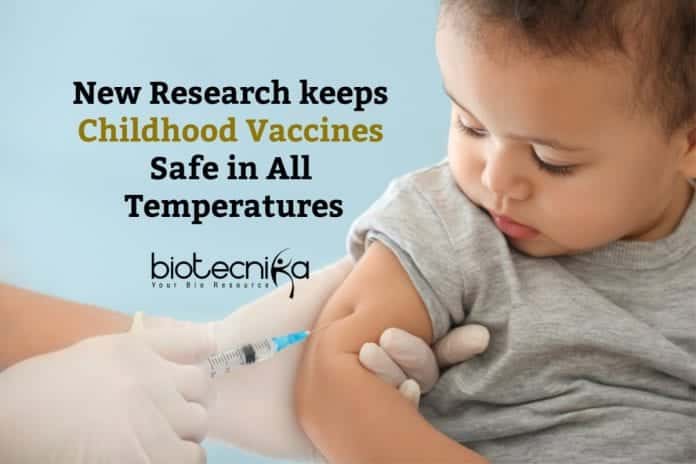Childhood Vaccines Safe in All Temperatures – Ensilicated Vaccines
Ground-breaking research has made it possible for a new system that can deliver vaccines safe in all temperatures, to children in low-income nations.
As vaccines spoil when not refrigerated, it is notoriously difficult to transport them to remote or dangerous places. Only at temperatures between 2°C and 8°C, formulations are safe and the vaccines become ineffective at other temperatures as the proteins start to unravel. Around the world, millions of children miss out on life-saving inoculations because of this.
Now, a way to prevent warmed-up vaccines from degrading has been found by the scientists. The structure remains intact even when heated to 100°C or stored at room temperature for up to three years by encasing protein molecules in a silica shell.
A team from the University of Bath in collaboration with the University of Newcastle developed a technique called ensilication, the technique for tailor-fitting a vaccine with a
silica coat. This pioneering technology has demonstrated its effectiveness in the real world now after it was seen to work in the lab two years ago.In the Scientific Reports journal, their latest study was published.
Through ordinary post from Bath to Newcastle (a journey time of over 300 miles, which by post takes a day or two), the researchers sent both ensilicated and regular samples of the tetanus vaccine. The vaccine was seen to be active as an immune response was triggered when doses of the ensilicated vaccine were subsequently injected into mice. When unprotected doses of the vaccine were injected in the mice, it could be seen that the medicine had been damaged in transit as there was no immune response was detected in mice.
The project from the University of Bath’s Department of Chemistry was led by Dr. Asel Sartbaeva, she said, “This data is really exciting because it is seen that ensilication preserves the function, the immunogenicity of the vaccine proteins and not just its structure.”
“In this project, the vaccine tetanus was focused on, which is given to young children in three doses, the part of the DTP (diphtheria, tetanus, and pertussis) vaccine. Next, a thermally-stable vaccine for diphtheria, and then for pertussis, vaccines will be developed. To ensure that every child in the world can be given DTP without having to rely on cold chain distribution, we want to create a silica cage for the whole DTP trivalent vaccine eventually.”
From the moment of manufacturing to the endpoint, the vaccine needs to be refrigerated for cold chain distribution.
Silica is a non-toxic and inorganic material. Humans can use the ensilicated vaccines within five to 15 years according to Dr. Sartbaeva’s estimations. She hopes to see the technology to silica-wrap proteins eventually being adopted to transport and store all childhood vaccines, as well as other protein-based products, like enzymes and antibodies.
She said, “In order to make important medicines more widely available, we want to ultimately make the important medicines stable. Cutting out dependence on cold chain and eradicating vaccine-preventable diseases in low-income countries by using thermally stable vaccines is the aim.”
At present, due to exposure to suboptimal temperatures, around 50% of vaccine doses are discarded before use. In 2018, around 19.4 million infants did not receive routine life-saving vaccinations, according to the World Health Organisation (WHO).
The Alumni Fund in the University of Bath, specifically the Annett Trust, ERC, MRC, BBSRC, and the Royal Society, funded this Bath research.
Source
Childhood Vaccines Safe in All Temperatures






























